We have a Maven based Android build, and we just made the switch from JDK 6 to 7.
This came with its share of IntelliJ problems though. What happens is that every time it detects a change in the POM, and reimports/refreshes the project, it returns to selecting the old "Module SDK", the one that's configured to use Java 6:

Even if I manually delete these SDKs from the "Platform Settings" dialog, they keep reappearing as "Maven Android API 19 Platform (N)" where N is the number used to disambiguate it from all the other (identical) SDKs.
I should mention that we do specify in the POM that Java 7 is targeted. I tried to set both the compiler plugin language level, and the maven.compiler.* properties (not sure if that accomplishes the same thing or not), without luck:
<plugin>
<groupId>org.apache.maven.plugins</groupId>
<artifactId>maven-compiler-plugin</artifactId>
<version>3.1</version>
<configuration>
<source>1.7</source>
<target>1.7</target>
</configuration>
</plugin>
shouldn't IntelliJ pick that up and always configure the project to use a Java 7 SDK? Am I missing something?
I noticed that the problem disappears when I remove any references to 1.6 SDKs entirely in IntelliJ. Not surprising I guess, but also not viable since I have other projects that still rely on the presence of a Java 6 SDK.